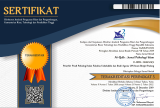Tuning into Kids Training to Improve Emotion Coaching’s Skill of Mother With Early Childhood Children
Abstract
Keywords
Full Text:
PDFReferences
Denham, S.A., Bassett, H.H., & Wyatt, T. (2016). The socialization of emotional competence. Dalam J. Grusec & P. Hastings (eds). The Handbook of Socialization (pp. 614- 637). New York: Guilford.
Denham, S.A., Ferrier, D.E., Howarth, G.Z., Herndon, K.J., & Bassett, H.H. (2016). Key considerations in assessing young children’s emotional competence. Cambridge Journal of Education, 46 (3), 299-317. http://dx.doi.org/10.1080/ 0305764X.2016.1146659.
Dunsmore, J. B. (2013). Parental emotion coaching and children emotion regulation as protective factors for children with oppositional deviant disorder. Soc Dev, 22 (3), 1-23.
Gottman, J. &. (1997). Rassing an emotionally intelligent child: the heart of parenting. New York: Simon & Schuster.
Gottman, J. K. (1996). Parental meta-emotion phylosophy and the emotional life of families: theoritical model and preliminary data. Jounal of Family Psychology, 10(3), 243-268.
Havighurst, S. K. (2015). Tuning in to kids: an emotion-focused prenting intervention for children with disruptive behavior problems. Association for child and adolescence mental health.
Havighurst, S. W. (2013). Tuning in to kids: Reducing young children's behavir problem using anemotion coaching parenting program. Child Psychiatry Hum Dev, 44, 347-268.
Hurlock, E. (1996). Psikologi Perkembangan (Terjemahan). Jakarta: Erlangga.
Irene, J., & Hendriati, A. (2017). Emotion coaching by preschool teachers in Jakarta. Proceeding. Dipresentasikan dalam International Conference on Psychology and Multiculturalism. Jakarta: Atma Jaya Catholic University of Indonesia
Morris, A. C. (2017). The impact of parenting on emotion regulation during childhood and adolescence. Child Development Perspective, 0(0), 1-6.
Ornaghi, v. P. (2019). The contribution of emotion knowledge, language ability, and maternal emotion socialization style to explaining toddler;s emotion regulation. Social Development, 28(3), 581-598.
Santoso, A. (2010). Studi Deskriptif Effect size Penelitian-Penelitian di Fakultas Psikologi Universitas Sanata Dharma. Jurnal Penelitian, 14(1), 1-17.
Wandansari, Y. (2020). Emotion coaching oleh ibu pada anak prasekolah. Jurnal Experientia, 8(1), 11-19.
Wilson, B. P. (2014). Parental emotion coaching: Assocoations with self-regulation in aggressive / rejected and low aggressive / populas children. Child and Family Behavior Therapy, 36(2), 81-106.
Wilson, K. H. (2012). Tuning in to kids: An effectiveness trial of a parenting program targeting emotion socialization of preschoolers. Jounal of Family Psychology, 26(1), 56-65.
Refbacks
- There are currently no refbacks.
Ruang Jurnal,
Fakultas Ushuluddin dan Studi Agama,
UIN Imam Bonjol Padang
Jl. Mahmud Yunus No.6,Lubuk Lintah,
Kota Padang, Sumatra Barat
E-mail: jurnal-alqalb@uinib.ac.id

This work is licensed under a Creative Commons Attribution-ShareAlike 4.0 International License.



